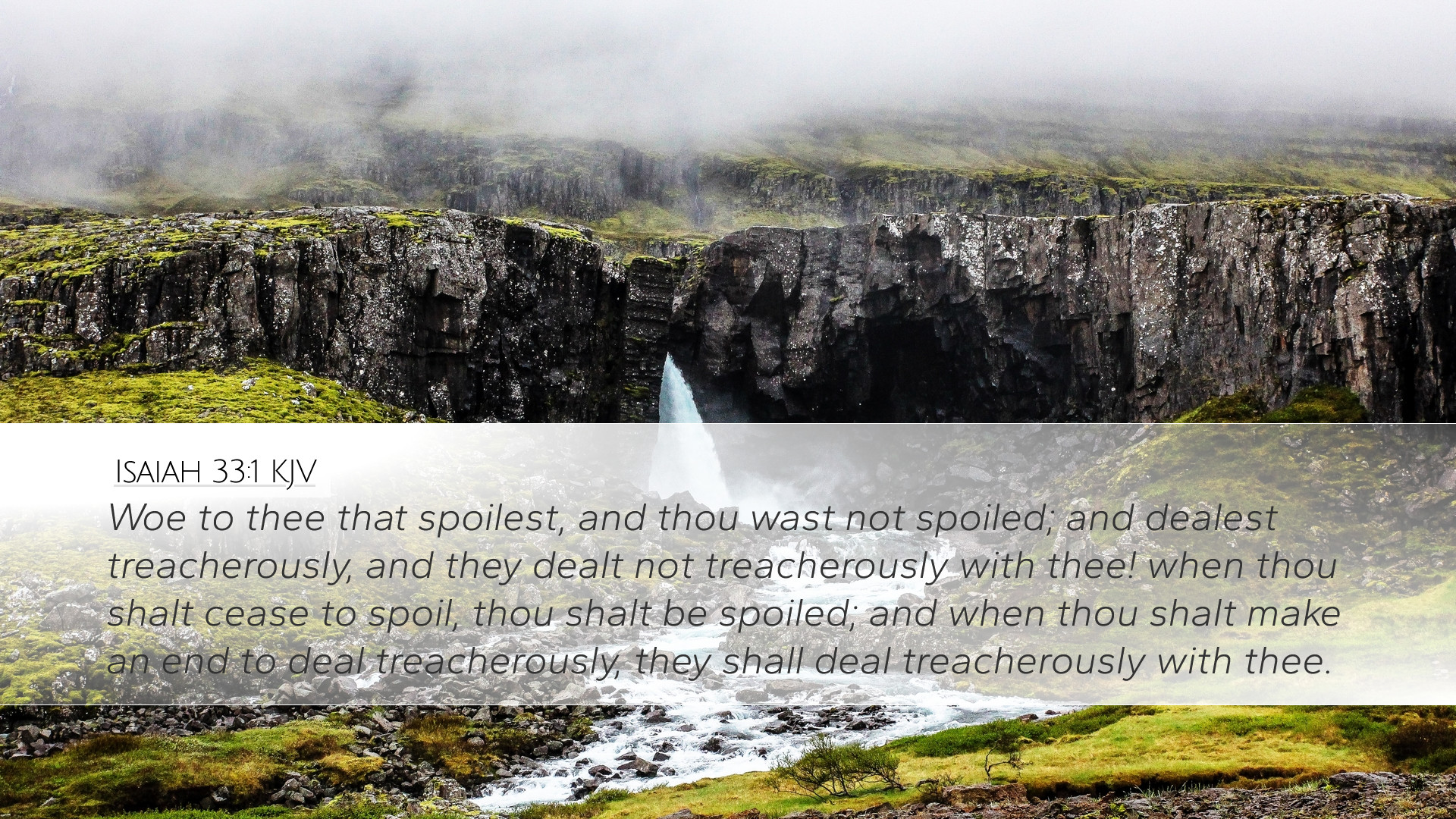Commentary on Isaiah 33:1
Verse Text: "Woe to you, O destroyer, you who have not been destroyed; you deceitful one, with whom no one has dealt treacherously! When you stop destroying, you will be destroyed; when you stop dealing treacherously, you will be dealt with treacherously."
Introduction
This powerful pronouncement in Isaiah 33 presents a duality of judgment and a reminder of divine justice. It serves as a warning against oppression, treachery, and the fate that befalls those who engage in such conduct. This commentary synthesizes insights from public domain sources to unpack its rich theological significance.
The Context of Isaiah 33
Isaiah’s prophecy occurs during a time of great threat to Judah, primarily from Assyria, a nation known for its ruthlessness. Scholar Albert Barnes highlights that this chapter brings hope amidst despair and judgment upon the enemies of God’s people, presenting a stark contrast between destruction and divine retribution.
The Nature of God's Judgment
Matthew Henry notes that the judgment pronounced against the destroyer functions primarily as a divine warning. It indicates that no nation or person, however mighty, can evade God's justice forever. The "destroyer" symbolizes not only the Assyrians but anyone who acts as an aggressor, consistent in their oppressive behavior.
Characteristics of the "Destroyer"
- Treachery: The term “deceitful one” signifies a person who betrays trust. This deception has both social and spiritual implications, leading others away from faith and righteousness.
- Inexorable Destruction: The verse suggests an unstoppable cycle of destruction, as the destroyer faces inevitable destruction in return.
- Judge and Judged: Barnes outlines that the verse presents a principle of reciprocity in judgment, where the sins of a nation will come back upon its head.
Theological Insights
Divine Sovereignty
Adam Clarke emphasizes the sovereignty of God in dispensing justice. The character of God as a righteous judge holds profound implications for both personal and communal ethics. This verse reminds readers that God observes the deeds of the nations and individuals, responding according to His divine will and purpose.
Covenantal Responsibility
The context of Israel’s covenant relationship with God further enriches this passage. Those in covenant with God are called to a higher standard, and the Lord’s judgment will reflect such responsibility. Failing to uphold justice and righteousness leads to severe consequences, as illustrated by the events facing Judah.
Practical Applications
For pastors and theologians, Isaiah 33:1 presents various applications:
- Pastoral Care: The passage can serve as a foundation for guiding congregations towards repentance and justice, particularly amidst societal injustices.
- Spiritual Warfare: Understanding the lines between righteousness and the actions of those who destroy can equip believers for spiritual battles against oppression and injustice.
- Calling for Accountability: It emphasizes the importance of holding leaders accountable to ethical standards, as their actions carry weight in the divine justice system.
Conclusion
Isaiah 33:1 leads to a sobering recognition of the consequences of human actions in the light of divine justice. This commentary through the lens of public domain writers like Matthew Henry, Albert Barnes, and Adam Clarke adds depth and clarity to the importance of righteousness in the life of the believer and the community.
In a world still torn by deceit, betrayal, and destruction, this verse serves as both a warning and a promise of restoration for those who uphold God's standards. The acknowledgment of God’s ultimate sovereignty invites all — students, pastors, theologians, and scholars alike — to reflect on justice, ethics, and the hope found in repentance.


